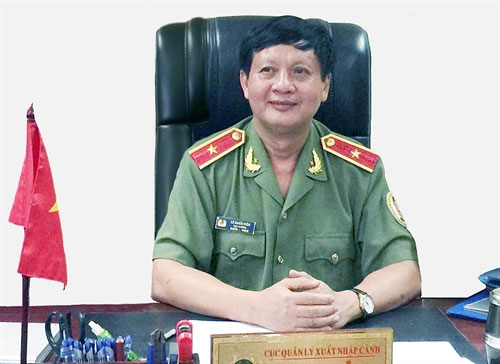VietNamNet Bridge – Major General Le Xuan Vien, head of the Immigration Management Department under the Ministry of Public Security’s General Department, talks to Viet Nam News about the entry and residence of foreigners in Viet Nam recently, and how to tighten order in the tourism sector.

|
|
Major General Le Xuan Vien
|
Can you tell us about the entry and exit of foreigners to Viet Nam recently?
In the first six months of this year, the number of foreigners who entered Viet Nam increased sharply, in line with the global integration trend oriented by the Party and the State.
There were more than 4.5 million foreign people entering Viet Nam in the first half of this year, increasing 28 per cent compared to the same period last year.
The foreigners entered Viet Nam mainly for tourism purposes, accounting for 76.5 per cent. About 20 per cent came for business purposes and the rest for other purposes.
The Law on Foreigners’ Entry into, Exit from, Transit through and Residence in Viet Nam which was adopted on January 1, 2015 has facilitated foreigners to enter, reside and work in Viet Nam and extended their benefits.
The law has also extended visa duration to five years for foreign investors and increased the number of visa symbols from 10 to 20.
In the context of the increasing number of foreigners’ entries to Viet Nam, the foreigners basically abided by Vietnamese laws. However, a small part of them, comprising 0.01 per cent, violated regulations on entry, exit, transit through and residence in Viet Nam.
The first type of violation is slow residency registration. According to the Law, after entry, foreigners must inform temporary residence to their hosting facilities. A number of foreigners did not inform, or facilities received registration information but were slow to report to Vietnamese authorities.
The second type of violation is taking advantage of visa issuance to do illegal actions. In fact, a number of tourists who were given tourist visas entered Viet Nam to purchase farm produce or work at foreign directed investment companies.
Other types of violations were also recorded, such as foreigners, especially Africans, with tourist visas trying to reside illegally in Viet Nam.
Among these violations, can you elaborate on violations of foreign tour guides in some provinces and cities that have been widely reported?
Illegal foreign tour guides essentially entered Viet Nam as tourists and then were used by Vietnamese tour operators as interpreters after Vietnamese tour guides presented information.
In fact, illegal foreign tour guides are not only from China but also from South Korea, Russia, etc. It begins from the fact that the number of foreign tourists from these countries to Viet Nam rose significantly while there was a shortage of Vietnamese tour guides, in terms of both quantity and quality.
Therefore, a number of Vietnamese tour operators cooperated with foreign operators to send foreign tour guides to illegally work in Viet Nam. These tours are self controlled.
What are difficulties faced by the Immigration Management Department in managing entry of illegal foreign tour guides in particular and foreigners in general to Viet Nam?
The difficulty is in discovering and imposing punishments on these tour guides. As their tours are self managed, it is very difficult to make inspections.
If there are any violations found, the Immigration Management Department will impose administrative penalties, deny visas and force violators to leave Viet Nam. In case of repeated violations, they will be banned from entry for two to three years following the law.
What are measures taken by the Ministry of Public Security in general, and the Immigration Management Department in particular, to avoid this type of violation and better manage entry, exit and residence of foreign tour guides and tourists in Viet Nam?
The Government has assigned the public security ministry to work with relevant ministries and sectors to inspect, impose punishments and ensure public order in the tourism sector. The Immigration Management Department has figured out a general plan following directions from the Security General Department.
We had a meeting on July 8 with representatives from tour operators which usually welcome foreign tourists to Viet Nam, the Ministry of Culture, Sports and Tourism, and the Ministry of Foreign Affairs. The gathering reached a final conclusion which focuses on tightening inspections and regulations.
When tour operators submit documents to the Immigration Management Department for foreign tourists’ entry approval, specific information must be clarified. The information includes names, mobile phone numbers, identification card numbers of tour guides, tour itinerary and addresses of hotels where tourists stay.
Based on this information, we will make unscheduled inspections when tourists enter Viet Nam or during the time tours are being operated in Viet Nam to see whether tour operators follow the itinerary and tourists stay at the registered hotels or not. Otherwise, they will be subjected to punishments.
We will also refuse to approve tourists’ entry if tour operators refuse to provide this information.
With this solution, we have received consensus from tour operators and related agencies at the meeting.
In addition, we sent working teams to provinces of Khanh Hoa, Binh Thuan, and Quang Ninh, and Da Nang City and use specialist skills of police to make inspections. We will soon announce the result to the media.
With co-operation among tour operators, ministries and sectors as well as specialist skills, we believe that order in the tourism sector will be soon reaffirmed.
VNS